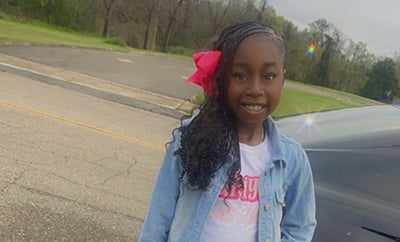Sickle cell disease
Courtney Snell wasn’t sure what it meant when she found out her daughter, Zariyah Blackmon, had sickle cell disease. Thanks to the help of Children’s of Alabama, however, both mom and daughter know how to manage it.
Sickle cell disease is a genetic mutation of the red blood cells that causes them to clump together and create blockages in blood flow. Patients with the disease often experience serious complications, including pain, infections, organ damage and failure, and anemia.
Zariyah was diagnosed when she was only a couple of months old with a severe but common form of the disease known as HbSS. When she was 6 months old, she had her first episode—swollen hands. In the nine years since then, she’s had to make the two-hour trip to Children’s “half a dozen times,” her mom says. She’s required multiple blood transfusions and suffered hair loss from medication. In her most recent episode, she developed a fever and was unable to walk.
But her care team at Children’s has always helped her through the challenges. Each time, Courtney has found the experience warm and welcoming. “They always have TVs and other activities to keep her busy,” she said. “They talk to her and give her stickers when her bloodwork is good. They do a good job of entertaining her.”
Throughout Zariyah’s journey, Children’s has helped her understand the disease and what’s happening to her body. “They talk to her first. I want her to understand what’s happening, and she listens,” Courtney said. “Then they ask me do I have any questions. They are very good about explaining and giving me papers and links where I can read more.”
Sickle cell disease hasn’t stopped Zariyah from living an active life. She loves to play outside, but Courtney knows she has to watch her closely to make sure she’s drinking plenty of fluids and taking other precautions. “She forgets she has sickle cell, and she wants to do a lot of things,” Courtney said.
With the team at Children’s of Alabama on their side, they’re learning to manage Zariyah’s disease, and they know her care team will always be available to help.











